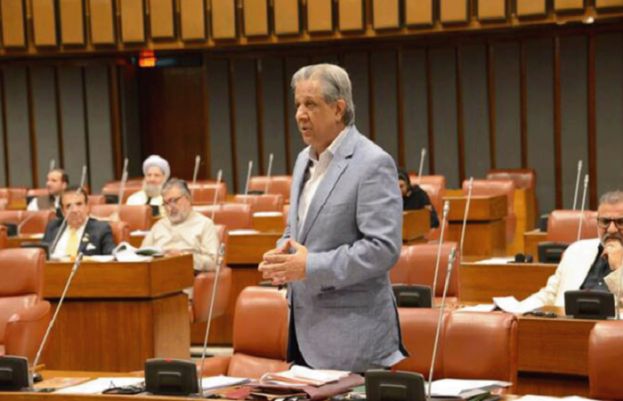In a major step toward amending the country’s Constitution, Federal Law Minister Azam Nazeer Tarar on Saturday presented the 27th Constitutional Amendment Bill in the upper house of Parliament. Senate Chairman Yousaf Raza Gillani immediately referred the bill to the Standing Committee on Law and Justice for further review. While introducing the bill, Tarar noted that constitutional amendments are traditionally scrutinized by a joint parliamentary committee comprising members of both the National Assembly and the Senate. “No vote will be held at this stage, as the committee will first examine the bill in detail,” he added. The law minister informed the house that deliberations would continue through the weekend to allow maximum participation. During the session, Senator Barrister Ali Zafar objected to discussing the amendment in the absence of the Leader of the Opposition in the Senate, saying it would be inappropriate to proceed until the seat was filled. He also noted that he had just received the draft and had not yet reviewed it. Responding to Zafar’s remarks, Deputy Prime Minister Ishaq Dar said that all senators would have the opportunity to speak on the issue but emphasized that standing committees were the appropriate forums for in-depth discussion. The bill was presented after the federal cabinet chaired virtually by Prime Minister Shehbaz Sharif from Baku approved the draft earlier in the day. The cabinet’s endorsement came a day after the Pakistan Peoples Party (PPP) expressed its support for amending Article 243, establishing a constitutional court, and ensuring democratic and civilian oversight in governance. PPP Chairman Bilawal Bhutto Zardari told reporters after his party’s Central Executive Committee meeting in Karachi that consensus had been reached on three major points: “Amending Article 243, creating a constitutional court, and managing judges’ transfers through proper consultation.” During the cabinet meeting, Prime Minister Shehbaz Sharif said the amendment represented “a collective effort to strengthen the federation’s ties with the provinces and serve the national interest.” He praised the Law Ministry, the attorney general, and their teams for preparing the draft, and acknowledged consultations with PML-N leader Nawaz Sharif, President Asif Ali Zardari, and coalition partners, including Bilawal Bhutto Zardari, Khalid Maqbool Siddiqui, Aleem Khan, Khalid Hussain Magsi, and Chaudhry Salik Hussain. Speaking to the media later, Tarar said the prime minister had consulted coalition allies to secure broad support for the proposed reforms, which include establishing a Federal Constitutional Court and entrusting judicial transfers to the Judicial Commission of Pakistan. “There have been longstanding concerns about judges’ transfers,” Tarar said. “Under the new proposal, if a judge seeks transfer between high courts, both chief justices of the respective courts will be part of the decision-making process.” Tarar also explained that the bill includes clarifications related to Article 243 and certain command structures in the armed forces, noting that the concept of “Field Marshal” was a ceremonial rank not originally defined in the Constitution. “Pakistan’s evolving defense and regional realities have taught us valuable lessons,” he added. “The nature of warfare has changed, and this amendment aims to bring our constitutional framework in line with modern defense and governance needs.” The law minister further revealed that the cabinet also discussed proposals from various political parties, including the Balochistan Awami Party’s request for additional provincial seats and the MQM-P’s recommendations on the local government system. Proposed 27th Amendment draft As per the proposed draft, available with Geo News, the position of Chairman Joint Chiefs of Staff Committee would be abolished, and a new title, “Chief of Defence Forces,” would be introduced for the head of the armed forces. The draft of the 27th Constitutional Amendment also outlines significant changes in the judicial system. The president and prime minister will play a key role in judicial appointments, while Parliament will have the authority to determine the number of judges in the Constitutional Court, the draft added. The amendment proposes a reduction in the powers of the Supreme Court, transferring certain constitutional authorities to the Federal Constitutional Court. All provinces will have equal representation in the new court, and the Chief Justice’s term is proposed for three years. In addition to judicial reforms, the amendment introduces major restructuring in the military hierarchy. Besides the creation of the Chief of Defence Forces, Field Marshal, and other senior officers will be granted lifetime status for their ranks, according to the draft.
Law minister presents 27th Constitutional Amendment bill in Senate after cabinet nod

